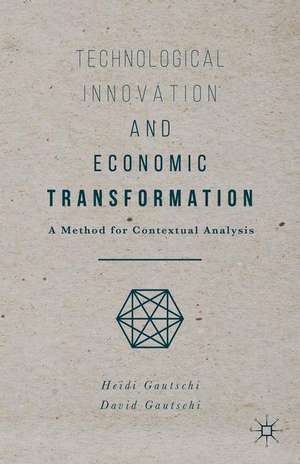Technological Innovation and Economic Transformation: A Method for Contextual Analysis
Autor Heidi Gautschi, David Gautschien Limba Engleză Hardback – 9 ian 2016
Drawing on Anglophone and Francophone literatures in business, economics, history, and sociology, this book reminds us that progress is often achieved at some sacrifice of well-being. It allows academics and practitioners from these traditions to engage in systematic communication and enrich one another with new ideas.
Preț: 696.18 lei
Preț vechi: 819.03 lei
-15% Nou
Puncte Express: 1044
Preț estimativ în valută:
133.22€ • 142.45$ • 111.07£
133.22€ • 142.45$ • 111.07£
Carte tipărită la comandă
Livrare economică 17 aprilie-01 mai
Preluare comenzi: 021 569.72.76
Specificații
ISBN-13: 9781137548689
ISBN-10: 1137548681
Pagini: 196
Ilustrații: XVII, 196 p.
Dimensiuni: 140 x 216 x 14 mm
Greutate: 0.4 kg
Ediția:1st ed. 2015
Editura: Palgrave Macmillan US
Colecția Palgrave Macmillan
Locul publicării:New York, United States
ISBN-10: 1137548681
Pagini: 196
Ilustrații: XVII, 196 p.
Dimensiuni: 140 x 216 x 14 mm
Greutate: 0.4 kg
Ediția:1st ed. 2015
Editura: Palgrave Macmillan US
Colecția Palgrave Macmillan
Locul publicării:New York, United States
Cuprins
List of Figures
List of Tables
Preface
Acknowledgments
1.Old Innovations, Ironies, and Crimes Against Reason
2.Framework for Assessing the Influence of Technological Innovation
3.Concepts
4.How Did We Get to Here? the role of the State in fostering context
5.What Contexts Could Be?
6.Concluding Thoughts
Bibliography
Index
List of Tables
Preface
Acknowledgments
1.Old Innovations, Ironies, and Crimes Against Reason
2.Framework for Assessing the Influence of Technological Innovation
3.Concepts
4.How Did We Get to Here? the role of the State in fostering context
5.What Contexts Could Be?
6.Concluding Thoughts
Bibliography
Index
Notă biografică
Heidi Gautschi is a Research Fellow in the College of Management at Ecole Polytechnique Federale de Lausanne, Switzerland. Prior to joining EPFL, she was Assistant Professor of Communication Studies at Lesley University, USA. Her main area of interest is communication technology and its interaction with society, with special emphasis on the comparative French and American contexts. She is the co-editor of Dancing with Digital Natives.
David Gautschi is Dean Emeritus and holds the Joseph Keating, S.J. Professorship at Fordham University, USA. He was previously the Kirby Cramer Scholar of Marketing and International Business at the University of Washington and has served on the faculties of Cornell, INSEAD, Yale, and Rensselaer Polytechnic Institute. He has founded three start-up companies in marketing analytics and served for four years as a Firm Director of Deloitte and Touche LLP in its e-business practice.
David Gautschi is Dean Emeritus and holds the Joseph Keating, S.J. Professorship at Fordham University, USA. He was previously the Kirby Cramer Scholar of Marketing and International Business at the University of Washington and has served on the faculties of Cornell, INSEAD, Yale, and Rensselaer Polytechnic Institute. He has founded three start-up companies in marketing analytics and served for four years as a Firm Director of Deloitte and Touche LLP in its e-business practice.
Textul de pe ultima copertă
Society, in its quest for order in an inherently chaotic natural setting, tends to think about technological innovation much too narrowly. Innovation is necessary for economic growth, yet this narrow attitude limits its possibilities and focuses on achieving a single goal without acknowledging its effect on other aspects of society. By thinking out of the box, this book encourages thoughtful innovation while remaining conscious of its positive and negative consequences for society. It presents a method for contextual analysis that enables assessment of the disruption that any innovation could induce, and puts ideas into contexts so that innovators may anticipate consequences, minimize resistance, and enhance acceptance.
Drawing on Anglophone and Francophone literatures in business, economics, history, and sociology, this book reminds us that progress is often achieved at some sacrifice of well-being. It allows academics and practitioners from these traditions to engage in systematic communication and enrich one another with new ideas.
Drawing on Anglophone and Francophone literatures in business, economics, history, and sociology, this book reminds us that progress is often achieved at some sacrifice of well-being. It allows academics and practitioners from these traditions to engage in systematic communication and enrich one another with new ideas.














